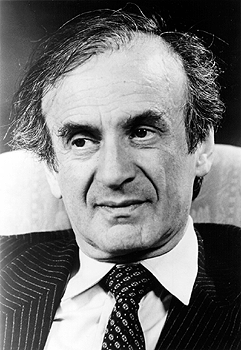

Through fiction, poetry, essays and plays, Elie Wiesel has attempted to reconcile his early experiences in Nazi Germany concentration camps, creating what is widely regarded as the most passionate and powerful of all Holocaust writing. With the publication of Night in 1960, Wiesel began a series of works which "bear witness," question God and challenge man. Although his stories and essays focus on the Jewish experience, many critics contend that their relevance lies in the author's ability to speak to all persecuted people and for humanity itself.
Wiesel teaches at Boston University and lectures internationally. His work has been widely translated and he is the recipient of numerous humanitarian and literary awards and honors, including the Prix Medicis, the Congressional Gold Medal and the Joseph Prize for Human Rights.
In 1986, Elie Wiesel was awarded the Nobel Peace Prize for his efforts to keep the memory of the Holocaust alive so that history will not be repeated. Chairman of the Norwegian Nobel Committee Egil Aarvik commented, "Wiesel is a messenger to mankind...His message is one of peace, atonement and human dignity. His belief that the forces fighting evil in the world can be victorious is a hard-won belief...repeated and deepened through the works of a great author."

